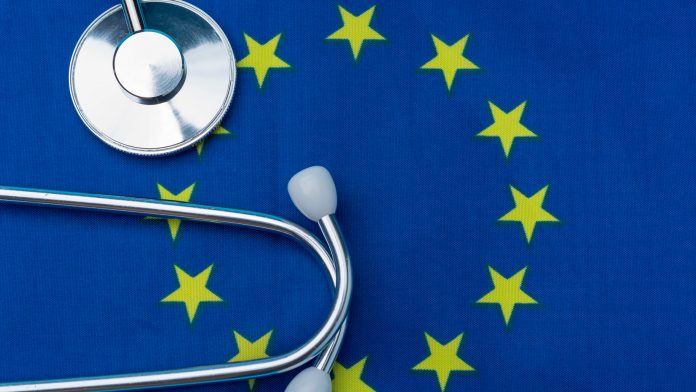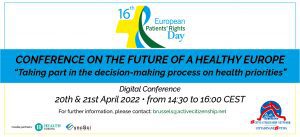
Mariano Votta, the Director of the Active Citizenship Network, the organisers of European Patients’ Rights Day, explores the importance of civic engagement in safeguarding the future health of Europeans.
More than two years of the Covid-19 pandemic, during which the health of each one of us has been jeopardised more than ever, do not seem to have been sufficient to increase the need for a “European Health Union” among citizens. The theme of health was among the least discussed in the context of the Conference on the Future of Europe. A paradox, a signal one should pay attention to or a missed opportunity? Probably, a bit of everything.
The Conference, with its structure of the three “P’s” (thematic Panels, Plenary sessions, and web Platform), despite its limitations, represented an exercise in civic participation with respect to which the European Commission, Parliament, and Council will soon be called upon to make public commitments.
We believe that among the lines of the recommendations that emerged from the Conference, there is room and, before the deliberations expected in May, still time to make further suggestions to the European Institutions, for example, on access to care with the objective of reducing the so-called health inequalities.
This will be discussed during the XVI Edition of the European Patients’ Rights Day (EPRD), whose celebrations are scheduled for the 20th and 21st of April, in the presence of Members of the European Parliament, representatives of the European Commission and the OECD, leaders of patients’ associations, healthcare professionals, experts and companies.
In particular, on April 20th, much attention will be paid to the opportunities and challenges of the new advanced therapies, which are expected to increase significantly over the next decade. By 2030, more than 50 new gene and cell therapies could be launched globally, affecting a total of about 350,000 patients and 50,000 patients each year, respectively. An encouraging but equally challenging scenario is the high costs and public budget constraints faced by several EU countries, aspects that must be addressed today in order not to arrive unprepared tomorrow.
The XVI European Patients’ Rights Day, promoted by the European branch of Cittadinanzattiva, Active Citizenship Network, for which the occasion has received an unconditional contribution from Boehringer Ingelheim, Illumina, MSD, Teva, Viatris, will also offer the opportunity on April 21st to assess the “Mission of Health” provided by the National Recovery and Resilience Plans (NRRPs).
We will inevitably be starting from Italy, the country that has received the most significant resources from the Next Generation EU, to then widen the view also to other realities. In this case, the reflections will start from the alarm launched by the European Economic and Social Committee that, since the Resolution voted in February 2021, openly calls for the involvement of civil society in the NRRPs.
Given the still evolving framework, one cannot overlook the denunciation of the European Economic and Social Committee, which stresses how “in most Member States, the NRRP consultation processes with the social partners and CSOs are far from satisfactory in relation to the justified demands of civil society and even in relation to the terms set out in the Recovery and Resilience Facility Regulation,” implying therefore how involvement has been, at least in its initial phase, marginal and far from that structured and organic perspective desired by the European legislator. “One barrier for involvement identified was the apparent unwillingness of some national governments to include civil society in the drafting of their plan. Rather than the government seeking to involve civil society, consultations were often carried out at the initiative of and following appeals from the social partners and other civil society organisations”.
One year on, has anything changed? Not so much on health issues, if we read the data emerged from the survey conducted by Active Citizenship Network in 18 European countries. Specifically, questioning 38 patient and advocacy associations resulted that in most cases, there has been no involvement of civic and patient associations by institutions in the definition of public health priorities.
The majority responded that they were not involved at all (35%) or were not informed of these processes (22%), while 35% responded positively. However, among those who responded positively, it should be noted that only 13% were involved from the outset in the consultation processes of social actors and civil society organisations, while 11% were involved to a very limited extent.
Nonetheless, regardless of any formal involvement by the authorities, more than half of the respondents (55%) confirmed that their association had provided civic recommendations to institutions in defining priorities in the public health sector.
If civic involvement in the priority-setting phase left much to be desired, even worse seems to be going on in the implementation phase of the NRRPs. A large majority of respondents (79%) stated that their organisation was not formally involved by institutions in the implementation of the National Recovery and Resilience Plan of the country, while only 10% confirmed their involvement through participation in debates, public consultations, and promotion of new health models.
In short, a bit like for the Conference on the Future of Europe, also for the NRRPs arises the question as to whether we are facing a paradox, a signal one should pay attention to, or yet another missed opportunity. And everything does not add up.









